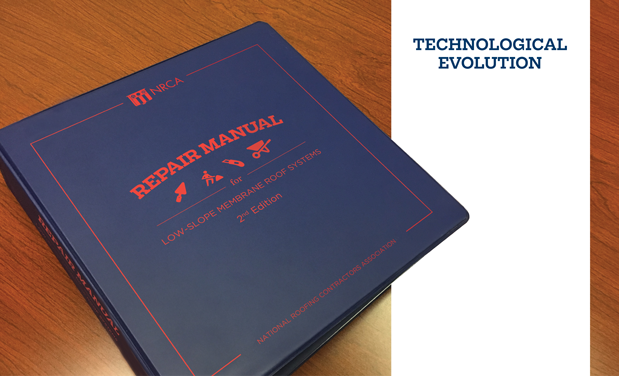To enact a long-term solution addressing members' workforce needs, NRCA continues to work with Congress to improve federal policy governing career and technical education (CTE) programs. NRCA is rallying support for the Strengthening Career and Technical Education for the 21st Century Act (H.R. 2353), legislation that would reform and reauthorize CTE programs operated under the Carl D. Perkins Career and Technical Education Act of 2006.
NRCA believes more effective CTE programs are vital to the roofing industry's long-term prosperity. It is becoming increasingly difficult for contractors, manufacturers, distributors and other industry employers to find enough workers to fill job openings despite ongoing recruitment efforts. Enticing wages haven't drawn enough workers—the average hourly wage for roofing workers was $18.74 in 2017, according to the Bureau of Labor Statistics.
NRCA expects the workforce shortage will become even more acute in the future given the current demographic trends of an aging workforce, the large number of students pursuing four-year college degrees and the physically demanding nature of roofing work.
Work in progress
For years, NRCA has worked with lawmakers to reform CTE programs because such programs would help students develop the skills needed to pursue rewarding careers in the roofing industry.
In 2015, Congress began drafting legislation to reauthorize the Carl D. Perkins Career and Technical Education Act, which authorizes and provides more than $1 billion in funding for CTE programs operated at local and state educational institutions. NRCA and allied groups developed recommendations designed to enhance opportunities for students to access CTE programs. Reauthorizing the act will provide maximum flexibility in the design of CTE programs to ensure they effectively meet rapidly changing economic demands.
In addition, there is a need for expanded employer-sponsored internships; on-the-job training opportunities; new sector partnerships between employers and educational institutions; and more incentives for the development of industry-recognized credentials. These reforms would complement and expand opportunities for NRCA ProCertification, the association's worker training and certification program currently in development.
In 2016, legislation including the suggested reforms was formally introduced by Rep. Glenn Thompson (R-Pa.). The bill was approved by the House of Representatives with strong bipartisan support in September 2016, but the Senate failed to take action before adjourning the 114th Congress at the end of 2016. Consequently, the bill was not enacted into law.
Current status
In 2017, Rep. Thompson and Rep. Raja Krishnamoorthi (D-Ill.) introduced slightly revised CTE reform legislation in the 115th Congress. H.R. 2353 again includes policy recommendations developed by NRCA and allied groups. The bill was approved by the House with overwhelming bipartisan support in June 2017.
The fate of H.R. 2353 now is in the hands of the Senate. A group of senators and their aides have been working for months to reach a compromise regarding the remaining partisan disagreements over the bill. The primary issue appears to be a dispute about the amount of authority given to the secretary of education under the terms of the bill. Republicans prefer to grant the secretary less authority and give local and state educational institutions more authority; Democrats favor granting the secretary more authority. Also, some senators in states that have lost population during the past decade have voiced concerns their states are likely to receive less funding under the bill's updated funding allocations.
Participants at NRCA's inaugural Roofing Day in D.C. 2018 event March 6-7 advocated in support of H.R. 2353 during meetings with their senators on Capitol Hill. NRCA staff also recently met with Senate offices to urge senators to resolve their differences and move the legislation forward.
It appears NRCA members' voices are finally being heard regarding this issue. In June, Sen. Lamar Alexander (R-Tenn.), chairman of the Senate Committee on Health, Education, Labor and Pensions, announced the committee would vote on H.R. 2353 or a similar Senate version of the bill. Sen. Alexander indicated he is working with Democrats on the committee, led by Sen. Patty Murray (D-Wash.), to reach a bipartisan compromise. If the committee's effort is successful, the bill could be approved by the Senate and sent to President Trump to be signed into law by the end of summer. However, if the Senate passes legislation that is not identical to H.R. 2353, any differences between the two bills must be resolved with the House.
Speak up
To complement NRCA's efforts in Washington, D.C., it is critical all NRCA members contact their senators in support of the bill. You can help make a difference by visiting the NRCA Grassroots Advocacy Network at roofingadvocacy.nrca.net and clicking on "Take action" and then "NRCA Action Alert: Urge your senators to support passage of H.R. 2353, legislation to reform and improve career and technical education programs" to send an email of support to your senators.
NRCA recognizes the importance of workforce development to its members and will continue working with lawmakers to pass H.R. 2353 or similar CTE reform legislation. When implemented in the coming years, programs developed under the reforms in this legislation could be critical to enabling roofing industry employers to meet their workforce needs.
Duane L. Musser is NRCA's vice president of government relations.
This column is part of Rules + Regs. Click here to read additional stories from this section.



